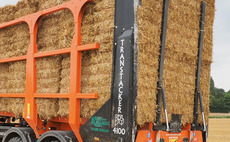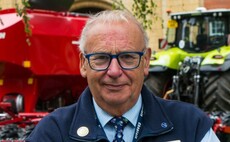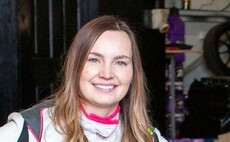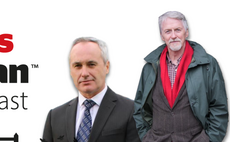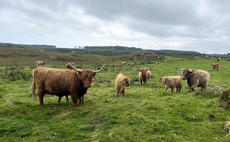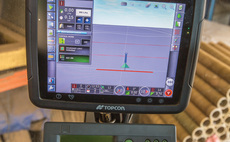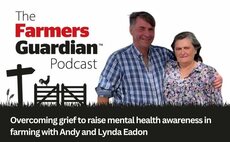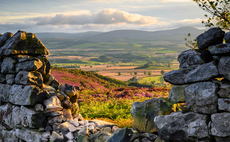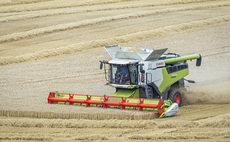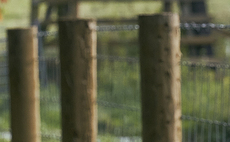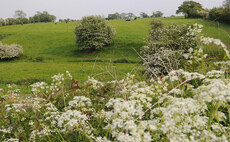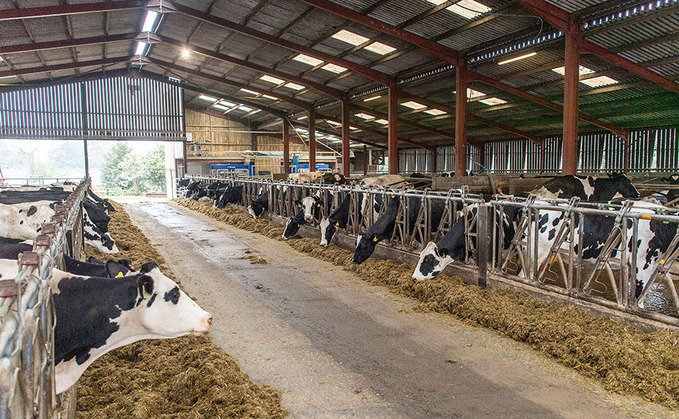
Staying true to the traditions of a small family farm is integral to one business in Cornwall, all while evolving with the changing face of agriculture. Ruth Wills pays them a visit.
Being greeted by four generations when arriving at a farm is becoming a rarity these days. But it is the most normal thing in the world for the Martin and Melhuish families at Tregartha Farm near Liskeard, Cornwall, particularly as their seed business, Roskilly and Henwood, now over 100 years old, is steeped in history.
The matriarch of the family is Pauline Martin, 97, who is still involved in the business, now helmed by her son Francis (Fred), and daughter Alison Melhuish (nee Martin). They are helped by Fred's son Simon, his wife Olivia, and their children, the youngest generation, Max (five) and Lowenna (two).
Tregartha and Trewolland Farm began as one farm, but as both Fred and Alison's children showed interest, they decided to split it in 2009.
Alison says: "It was the best thing we ever did; Fred and his son carried on with the dairy and the beef, my family and I did sheep and beef, and we share all the machinery.
Fortunately, there were two houses, so, across the road at Trewolland, Alison farms in partnership with her husband Russell and their son Jonathan, with help from their daughter, Emma.
Management
Across 202 hectares (500 acres), they farm 200 beef cattle of various breeds including Aberdeen-Angus, Hereford and Friesian, and 650 ewes, comprising Hartline, Aberfield, Suffolk, Texel, South Down and Zwartbles. Everything is finished on-farm and goes straight to the abattoir, with lamb going to Waitrose and beef going to Dunbia and Kepak.
"We don't want our animals to travel long distances and we think it is very important to support our local abattoirs," says Alison.
"When Dad was farming, he always tried to grow all the feed and straw and bred all the stock on-farm. We are trying to do the same but do have to buy in calves and some stores, but all replacement ewes and many of our rams are home bred."
On the dairy side, Fred, Simon and Olivia run 12ha (300 acres) with 130 Holstein Friesian milking cows plus followers, with all beef calves finished.
And three years ago, fuelled by the desire to keep it in the family, they installed three DeLaval robots, funded by an Rural Development Programme for England grant.
Olivia says: "We don't employ anyone, so it was a case of do we increase the herd and have a herdsman, or do we put the robots in?
"The robots allowed us to continue running the farm as before but gave us the flexibility we needed with a young family and managing the seed business."
The cows are currently housed year-round, however, the family plan to move to a grazing system soon.
But they acknowledge this will take some time. It took, they say, a while for the cows to transition from the parlour to the robots, and the next step will be the grazing.
The herd is fed a total mixed ration comprising homegrown cereals, grass and maize, plus soya.
Olivia says: "We grow our own cereals to reduce the amount of purchased feed. The cereals are processed into an Alkagrain which is rumen friendly and high in protein, limiting the need for a bought-in protein source."
And the family breed all their own replacements, using artificial insemination with Holstein Friesian sexed semen and have an Angus bull.
Olivia says: "We rear and finish all the beef calves for the abattoir."
Historic
The Roskilly and Henwood seed business started in 1923 - the family buy straight seeds and mix them to suit each customer's needs.
Alison says: "I think we're the only business in Cornwall which does it.
"I have been involved my whole life. Being a family business, you grow up in it; no doubt mum helped her dad, and likewise our children have done the same."
The family supply everything from grass mixes to forage and cover crops, as well as amenity seeds for gardens and sports pitches. Plus, their local customer base works well for them, selecting and selling seeds which are suitable for Devon and Cornwall.
Alison says: "The business has to run alongside our farming operations. Our busiest time of year is August and September. When the phone rings at nine o'clock at night, we're still here.
"But that's our niche; whatever they want, when they want it, and we are competitively priced because it's all in house. We also like to think we can give good advice as we are farmers ourselves."
The family are beginning to see some of the old varieties and herbal leys coming back around too, while also supplying mixes for the Countryside Stewardship scheme.
Alison says: "Over the past few years, we have seen varieties that my dad was putting in like vetch, alsike and cocksfoot, which we lost for a while.
"Environmental and wildflower mixes are growing in popularity and have become an increasing part of our business."
Although the whole family muck in, Alison tends to oversee the paperwork, while Fred mixes the seeds and Olivia and Simon do most of the deliveries - but matriarch Pauline is never far away.
Olivia says: "If she hears the mixer going, she'll come in and help unstitch bags, weigh out the seed and mix up."
Flowers
But the family gained some unexpected attention five years ago, when they sowed a patch of flowers - an attraction which has grown and raised money for charity since 2019.
It then went on to gain international attention.
Olivia says: "It happened by accident really.
"We put in a little patch of flowers to see what it would look like. Then Simon and Fred sowed some in the field, and people said it looked really nice. So, we opened the field one Sunday afternoon for people to walk through and raise a bit of money for the church roof - the feedback was amazing.
"There was a local artist who put a 20 second clip on Facebook, which went viral - it had nine million views.
People contacted me from across the world; India, America, Europe - all wanting to get hold of this seed."
Unfortunately, due to export rules, Olivia was not able to send the seeds abroad, but made some small packets to sell to visitors in the field, which has opened up enquiries into the wildflower market.
Olivia says: "It's not our primary market but people do ask for it.
"We even had a model who came down from Bristol because she wanted to do a photoshoot in among the barley and the flowers."
The following year they planted some more, and shortly after, Covid-19 struck.
"We wondered if it was the right thing. But I think it was really positive for people's mental health - they could come out for an hour, especially those with little ones, and do their exercise," adds Olivia.
But they also used it as an educational tool, with flyers helping visitors identify different flower and pollinator species, and the added purchase of an ice cream bike has proven popular too.
Olivia says: "This year we raised £1,400 to be split between two local charities; we allowed people to pick a small bunch of flowers for a donation which I think helped.
"We had a bit of a catastrophe with the sunflowers this year. We sowed them twice and they failed - we think it was the rabbits and mice. So, we sowed them again, mixed with phacelia, which has helped."
The family have navigated difficult situations like succession all while building successful businesses, and keeping a traditional, family farm is the aim.
Alison says: "We have thriving, busy farms and our independent, local seed business with a loyal customer base.
"We want to keep these small family farms going because a lot of them seem to be disappearing. So, we're not going in for hundreds of acres - we want to keep it in the family for future generations and make it sustainable."
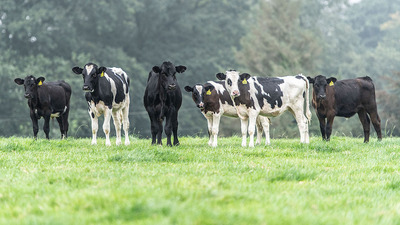
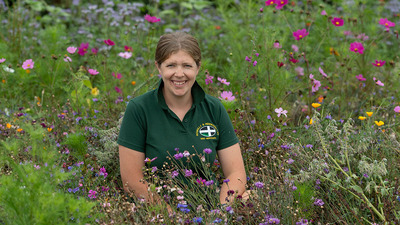
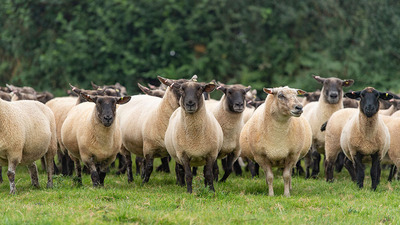
Farm facts
- Dairy: 9,000 litres, 4.4 per cent butterfat and 3.35 per cent protein, supplying Saputo
- DIY artificial insemination, using Holstein Friesian sexed semen and Angus bull
- Medium loam soil type
- Diversifications include the Roskilly and Henwood seed business, the flower field and office spaces from converted barns
- Tregartha: 81 hectares (200 acres) of maize and barley for dairy cattle feed
- Trewolland: 81ha (200 acres) owned, 121ha (300 acres) rented, 650 ewes and 200 beef cattle






